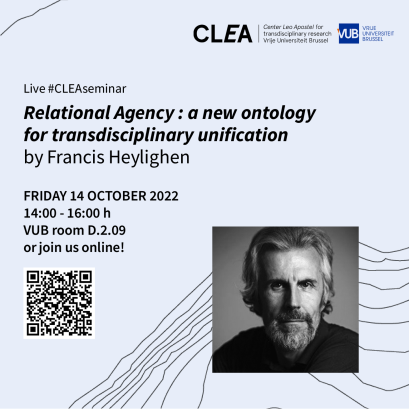The traditional scientific worldview tries to explain all phenomena by reducing them to static objects (or particles) moved by external forces. This Newtonian perspective cannot explain emergent, adaptive phenomena, such as goal-directedness, life, mind, society or consciousness. To integrate such phenomena within a unified science, we need to replace the traditional object-based ontology by a process-based one that is here called 'relational agency'. This framework integrates and generalizes a number of recent approaches including Agent-Based Modelling, Complex Adaptive Systems, Actor-Network Theory, and Posthumanism.
In this seminar, Francis Heylighen will sketch the history of both relational and object-based worldviews, going back to their roots in respectively animism and Greek philosophy. He will then introduce the basic concepts of the relational agency model: resources, reactions, agents, and networks. The fundamental evolutionary mechanism is that agencies and reactions mutually adapt so as to form a self-maintaining organization, in which everything consumed by one process is produced again by one or more other processes. Such an autonomous organization defines a higher-level agency, which will similarly adapt, and thus become embedded in a network of relationships with other agencies.
More info:
Heylighen, F. (2022): Relational agency: a new ontology for co-evolving systems
(Submitted), in: Evolution 'On Purpose': Teleonomy in Living Systems. Corning, P. (ed.). MIT Press, (Vienna Series in Theoretical Biology).
https://researchportal.vub.be/files/79556854/Heylighen_RelationalAgency.pdf
The Speaker:
Francis Heylighen is a VUB professor and director of CLEA. The main focus of his research is the origin and evolution of complex and in particular, intelligent organizations. How do systems emerge, self-organize, adapt and achieve some form of cognition? Heylighen approaches these problems starting from an ontology of actions or processes: the building blocks of reality are not material particles or "things", but interactions. Systems are then merely self-maintaining networks of processes, as elegantly modelled by the formalism of COT. Francis Heylighen has worked in particular on the development of collective intelligence or distributed cognition and its application to the emerging 'global brain'. He has also been looking at how individual agents tackle challenges via action, exploration, and learning, and how their interactions become coordinated via connectionist networks and stigmergy.
Practical
The CLEA seminars are taking place simultaneously at the VUB campus in Etterbeek, Brussels, and online (via Zoom) and are open to everyone interested!
When. Friday October 14, 2022 from 14:00 until 16:00h
Where (live). VUB campus Etterbeek, room D.2.09
Online. You can follow online via Zoom. You may need a Meeting ID and passcode to enter.
Zoom link: https://us06web.zoom.us/j/82757798426?pwd=em9sQlJDVjJYTEFRNk01dEJLWGxGUT09
Meeting ID: 827 5779 8426
Passcode: 122127
Video:
Acknowledgement
This seminar was supported by the John Templeton Foundation through the grant ID61733 The Origins of Goal-Directedness.

